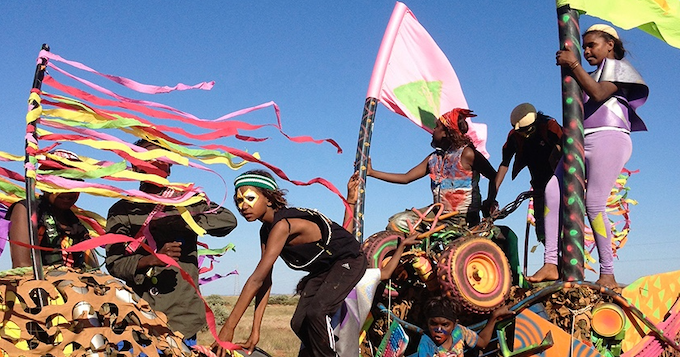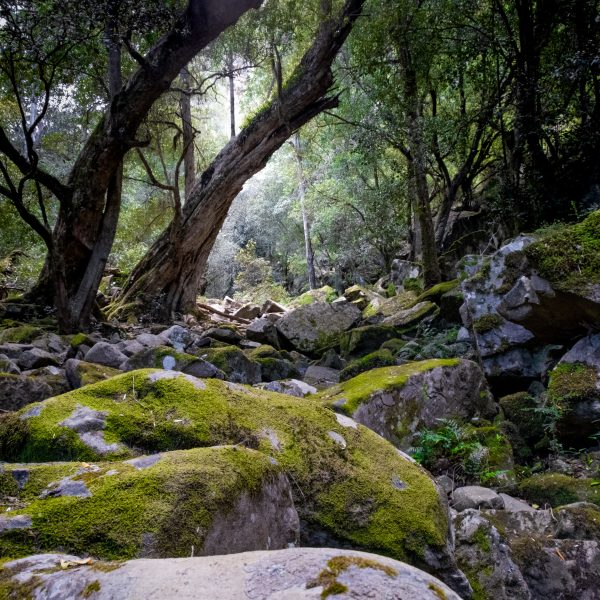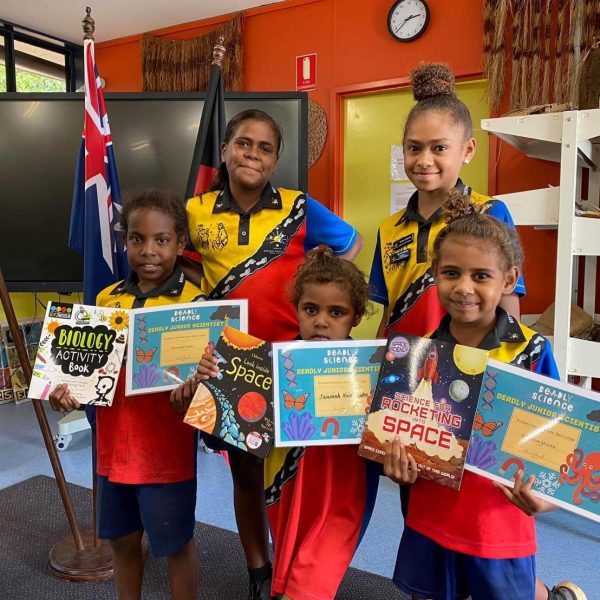How To Transport Our Understanding Of First Nations Cultures To Abundant Futures

Big hART’s Creative Learning Producer, April Phillips, and Scott Rankin CEO reflect on the elements, process and approach of co-creating an ambitious First Nations led education project with the community of Ieramugadu (Roebourne), in the Pilbara W.A.
In the education sector, First Nations content and knowledge is widely accepted as rich, layered and highly important. However, most often this content is situated as: ‘a long, long time ago,’ steeped in broad generalisations, and seen through a deficit lens. Rarely do we ask; how might we present and build on this rich content and ideas, so as to privilege First Nations ‘cultures and histories’ as also strong and future focused? And also, how can we deliver learning in such a way as to move beyond the deficit lens?
Through this retro positioning, we can lose sight of what is here now and strong and abundant, as well as what might be coming next. Cultural continuity in the past is remarkable, but so too is future continuity. Being able to acknowledge and present the lived experiences in the now, that will be taking us tens of thousands of years beyond now, holds inspiring educational potential. In partnership with the community of Ieramugadu, a new educational platform for this kind of approach has emerged, co-created with Big hART.
Big hART/ Ieramugadu partnership
Big hART, a social change and arts not-for profit was founded in 1992 with a purpose to illuminate hidden narratives. Nations are narrations (E. Said), and they are emergent and ‘told’ into being. And if you are excluded from, or demonised in that ‘telling,’ you are open to abandonment, hurt and trauma. The phrase, ‘it is harder to hurt someone if you know their story,’ underpins Big hART’s work.
Over a decade ago Big hART was invited by senior women to come to Ieramugadu and work with their young people, and tell the hidden stories. One of the first ideas they shared was, ‘heritage is a future leaning concept, it is our young people.’ This became a foundational piece of learning for Big hART, and set the tone of the Yijala Yala project. It has given rise to many opportunities for co-creation with the community. One such project was NEOMAD.
NEOMAD and NEO-Learning
NEOMAD, is a Gold Ledger Award winning First Nations sci-fi interactive comic, produced by Big hART, created by artist SUTU (Stu Campbell) and the community of Ieramugadu (Roebourne). More than forty young people worked alongside SUTU to develop digital skills, complete the images and ensure the magic of illuminated colours, recorded sounds and local languages were embedded in every page. Set in 2076, NEOMAD is an exemplar of the positivity that shines when First Nations are privileged with future continuity as well as past. The project champions a rare narrative – First Nations young people maintaining cultural work in the context of childhood freedoms, navigating dual worlds, and living fast paced adventures – all under the care and watchful eye of Elders.
Once people read it, they say, “NEOMAD should be in all schools!”
Bridging worlds: a support framework for futurism
Air dropping NEOMAD comics into every school in Australia could have been one way to reach our audience. And why not? Kids love it and the comic will surely bring future-focused fun to the classroom. However, ‘context’ has emerged as a step before the comic is read. The all-important introduction is the make-or-break moment, in amplifying the impact for both teachers and students.
What we uncovered was a tentative hesitation amongst teachers, in knowing how to present First Nations futurism, in the present day, when reconciliation is still a long way off. This led to investigation informed by teachers: how might we take the conversation of futurism wider than NEOMAD alone? What would happen if we adopted a futuristic mode – live virtual education to bring co-learning to both teacher and students, in a safe, dynamic, fun parallel place? As a result, Big hART has developed a ‘supported learning’ offering, funded by the Telstra Foundations #Tech4good program.
Future focused in content and delivery
In the NEO-Learning classroom, each student and their teacher arrive at a virtual destination. In the virtual classroom we spend time together, hear how to pronounce nation names – ‘Ngarluma’ and ‘Yindjibarndi’ from custodian Patrick Churnside via sound pods; we make predictions in the chat; we listen, read, look closely, share what we notice, download, vote and dance.
“We have never done anything like this before,” they say.
Co-creation and self-determination is key
NEO-Learning is now a national offering, featuring a flow of additional content from the I Ieramugadu community, mentored in a new, on country Digital Lab. Big hART supports and champions local artists, many of whom are still in school. Artists make work based on their own lived experience, with new technical skills, alongside their peers. This after school learning isn’t a compulsory burden on young people, the learning is social, fun, grounding and good. The learning journey in digital art making is informed by mutual respect between artist mentors, young content creators and Elders.
Shifting Perceptions
There is a hunger in schools for new ways of knowing. Through NEO-Learning, First Nations digital artists, showcasing new technological modes, are helping to rewire ‘past tense’ assumptions about culture. And when strong digital art lands in a student’s world, the response is overwhelmingly positive and affirming. Young people recognise peer to peer learning as an act of generosity. As it catches on, young people try walking in each other’s shoes – running shoes, dancing shoes, space shoes, and imaginative futurist shoes – lets arrive before we leave!
Find out more about NEO-Learning here
April Phillips is a Wiradjuri-Scottish woman of the Galari people. She works across disciplines as an audience specialist, digital artist, virtual educator and researcher. Currently the Creative Learning Producer at Big hART, April has been part of the NEO-learning development team since early 2020. April has contributed to international graphic anthropology research under the topic of ‘childhood play’ in the living memory of adults. She is associated as a community member of the Graduate Certificate of Wiradjuri Language, Culture and Heritage; a graduate of the Bachelor of Creative Arts and Design and has partially completed a Masters of Education at Charles Sturt University.
Scott Rankin is a nationally renowned public speaker, writer, director, cultural commentator and co-founder of Big hART. His theatre, documentary and television projects have won multiple awards. Scott was the 2018 Tasmanian Australian of the Year, is an Adjunct Professor at the University of Tasmania and is a PHD candidate at the Queensland University of Technology.
This article was originally published on EduResearch Matters. Read the original article.
Popular

Workforce
Policy
Quality
Practice
Provider
Research
ECEC must change now, our children can’t wait for another inquiry
2025-07-02 07:47:14
by Fiona Alston

Workforce
Practice
Provider
Quality
Research
Supporting successful transitions: Big moves, big feelings
2025-06-26 11:00:30
by Fiona Alston

Practice
Quality
Research
When joyful autonomy matters so much more than curriculum outcomes
2025-06-25 09:30:36
by Contributed Content













